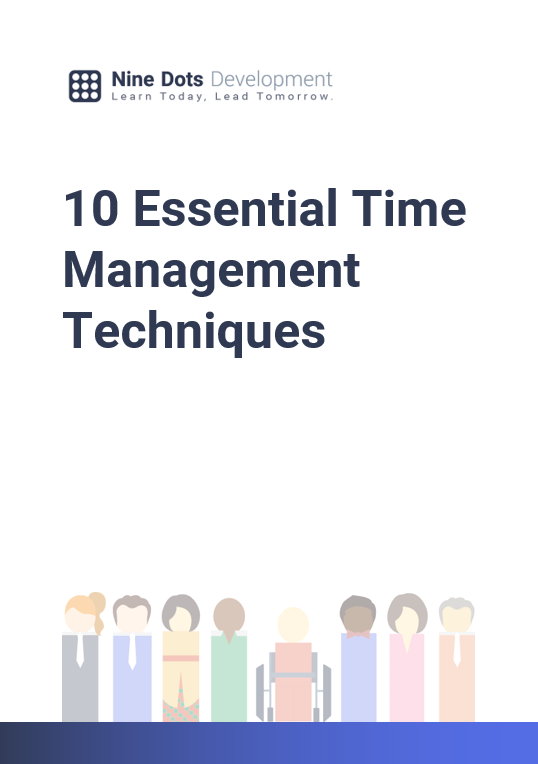Friday 19 May 2023 Article
The Takeaway10 Essential Time Management Techniques for First-Time Managers
How to Overcome the Trials and Tribulations of First-time Management
Part 5
#Time #Tips #Delegation #Efficiency #Prioritisation #UrgentImportantMatrix
The perfectly matched resource for this article...
[10 Top Techniques] Download a Quick Guide to Our Top 10 Time Management Techniques for New Managers here!
Time management can be challenging especially for new managers, so this quick guide highlights 10 helpful tips for getting more from your time.
Download!Playing catchup?
10 Essential Time Management Techniques for First-Time Managers
As a first-time manager, juggling multiple responsibilities and tasks can be overwhelming. Effective time management is a crucial skill that can enhance productivity, reduce stress, and drive success in your new role. By implementing essential time management techniques, you can optimise your efficiency and make the most of your limited time. In this article, we will explore ten essential time management techniques for first-time managers, empowering you to manage your time effectively and achieve your goals.
Prioritise Tasks
Start by identifying and prioritising tasks based on their urgency and importance. Focus on high-priority tasks that align with your team's objectives and the organisation's goals. You can utilise techniques like the Eisenhower Matrix, which categorises tasks into four quadrants based on their urgency and importance. By distinguishing between urgent and important tasks, you can allocate your time and energy more efficiently and avoid being consumed by non-essential activities.
Set Clear Goals and Deadlines
Establish clear goals and deadlines for yourself and your team by breaking down larger objectives into smaller, manageable tasks with specific timelines. This approach not only provides clarity but also creates a sense of purpose and urgency. Communicate these goals and deadlines effectively to your team, ensuring everyone is aligned and aware of their individual responsibilities. By setting clear expectations, you can maintain focus and ensure progress towards your goals.

Delegate Effectively
As a first-time manager, it’s important to recognise that you cannot handle every task on your own. You should therefore delegate responsibilities to capable team members, leveraging their strengths and expertise, and clearly communicate expectations, provide necessary resources, and establish checkpoints for progress. Delegating tasks not only frees up your time but also fosters team collaboration and development. Trust in your team's abilities and empower them to take ownership of their assigned tasks, allowing you to focus on higher-level responsibilities.
Manage Interruptions and Distractions
Interruptions and distractions can significantly derail your productivity. You can minimise them by creating a conducive work environment and implementing strategies to limit distractions. For example, close unnecessary tabs on your computer, turn off non-essential notifications, and establish designated blocks of uninterrupted work time. Communicate your availability and preferred communication channels to your team, setting boundaries and encouraging effective communication practices. By managing interruptions proactively, you can safeguard your focus and make better use of your time.
Use Time-Blocking Techniques
Time blocking involves scheduling specific blocks of time for different tasks or activities. Allocate dedicated time slots for essential activities such as strategic planning, team meetings, and individual work. This technique helps you stay organised and ensures that important tasks receive the attention they deserve. It is also important to avoid overloading your schedule and allow for flexibility to accommodate unexpected events. By visually representing your time commitments, time blocking enhances your ability to manage your time effectively and maintain a balanced workload.
Practice the Pomodoro Technique
The Pomodoro Technique is a time management method that involves working in focused intervals followed by short breaks. Set a timer for 25 minutes and work on a single task with complete concentration. After each session, take a short break of 5 minutes before starting the next interval. Every four intervals, take a more extended break of 15-30 minutes. This technique helps combat procrastination, boosts productivity, and prevents burnout by providing structured work-rest cycles.
Streamline Communication
Effective communication is vital for time management. Streamline your communication channels by utilising tools such as project management software, instant messaging apps, or shared document platforms. Set clear communication guidelines with your team, establishing preferred modes of communication for different types of communication. Encourage concise and focused communication, avoiding unnecessary back-and-forth exchanges. Consider implementing regular check-in meetings or utilising collaborative platforms to ensure that communication is efficient and relevant. By streamlining communication, you can reduce time spent on unnecessary conversations and ensure that information flows smoothly within your team.

Practice the 2-Minute Rule
The 2-minute rule states that if a task can be completed in two minutes or less, it should be done immediately. Rather than letting small tasks accumulate and create a backlog, address them promptly. Respond to quick emails, make brief phone calls, or complete simple administrative tasks right away. This approach prevents small tasks from piling up and becoming a distraction or source of stress. By applying the 2-minute rule, you can maintain a sense of progress and prevent minor tasks from consuming excessive time and mental energy.
Embrace Automation and Technology
Take advantage of automation and technology tools to streamline repetitive tasks. Explore project management software, task management apps, or email filters that can automate routine processes. Use scheduling tools to manage appointments and reminders effectively. Delegate routine administrative tasks to virtual assistants or utilise AI-powered tools for data analysis and reporting. Embracing technology frees up your time for more strategic and high-value activities. However, be mindful of selecting tools that align with your specific needs and do not become a source of additional complexity or distractions.
Practice Self-Care and Work-Life Balance
Effective time management goes beyond work-related tasks. Take care of your well-being and maintain a healthy work-life balance by prioritising self-care activities, such as exercise, adequate sleep, and relaxation, to ensure optimal productivity and energy levels. Set boundaries between work and personal life, allowing yourself time to recharge and engage in activities outside of work. Remember that managing your time effectively includes taking care of yourself. By nurturing your well-being, you can bring your best self to work and sustain your productivity in the long run.
Conclusion
Mastering time management techniques is a critical skill for first-time managers to achieve success in their roles. By using the above techniques, you can optimise your productivity and make the most of your time, reducing stress and increasing efficiency.
[10 Top Techniques] Download a Quick Guide to Our Top 10 Time Management Techniques for New Managers here!
Time management can be challenging especially for new managers, so this quick guide highlights 10 helpful tips for getting more from your time.
Download!Missed an article?
More from How to Overcome the Trials and Tribulations of First-time Management
